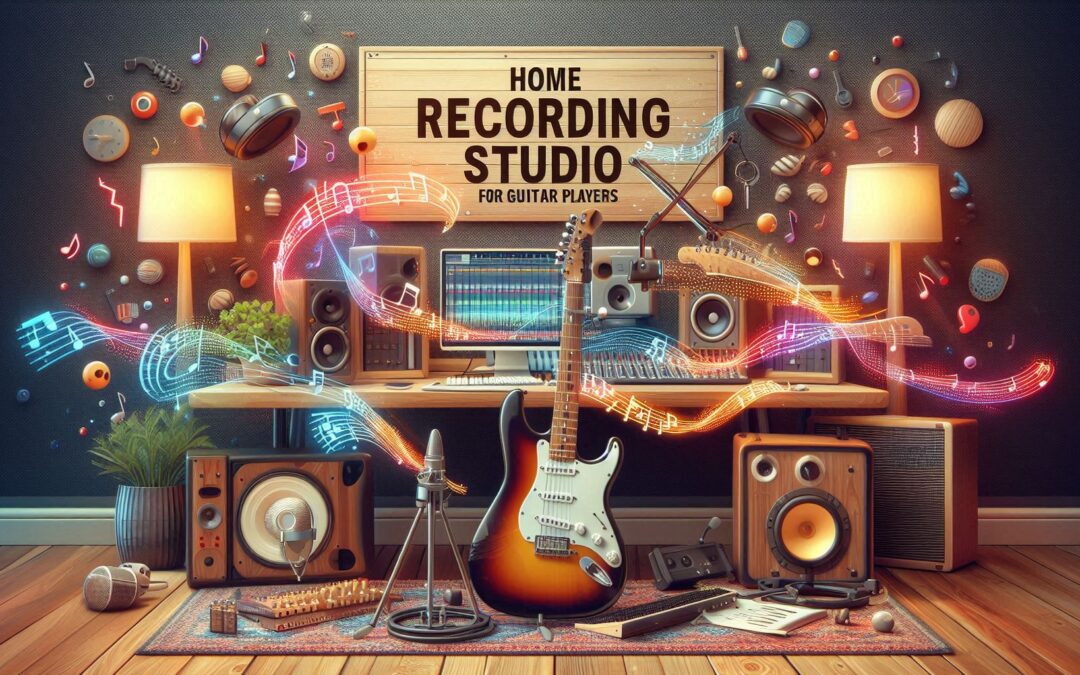Best Microphones for Guitar: Creating Your Music At Home
Table of Contents
Introduction
Choosing the right microphone is crucial when it comes to creating music at home, especially for recording guitar. Whether you’re strumming an acoustic or shredding on an electric, the perfect microphone can capture the essence of your sound. This guide will dive deep into the best microphones for guitar recording, helping you make an informed decision.
Understanding Microphones for Guitar Recording
Before we delve into specific products, let’s first understand the different types of microphones available.
Types of Microphones: Dynamic vs. Condenser
Dynamic microphones are known for their durability and ability to handle high sound pressure levels, making them ideal for electric guitar amps. On the other hand, condenser microphones are sensitive and offer a broader frequency response, which is excellent for capturing the nuances of an acoustic guitar.
Characteristics of an Ideal Guitar Microphone
An ideal guitar microphone should be able to capture the full sound spectrum of your instrument, from the low-end thumps to the high-end twangs. It should handle the dynamic range of your playing and adapt to different recording environments.
Factors to Consider When Choosing a Microphone
Budget Constraints
Microphones come in a wide range of prices, and it’s essential to find one that offers the best value within your budget.
Recording Environment
The space where you record significantly impacts the sound; a well-treated room will yield better results with almost any microphone.
Guitar Type and Style
Acoustic, electric, classical, or bass guitars all have different recording needs. Your playing style, whether fingerpicking or heavy riffing, will also influence your choice.
Dynamic Microphones
Overview of Dynamic Microphones
Dynamic microphones operate using a diaphragm and coil system. These are often rugged and less sensitive to room acoustics, making them ideal for live settings and high-decibel sound sources like electric guitar amplifiers.
Advantages and Disadvantages
Dynamic mics are generally more affordable and durable but may lack the sensitivity and frequency range of condenser mics.
Condenser Microphones
Overview of Condenser Microphones
Condenser microphones use a diaphragm in front of a backplate to capture sound. They need a power source (Phantom Power) and are more sensitive to subtle sounds, making them perfect for capturing the intricate details of an acoustic guitar.
Advantages and Disadvantages
These mics offer a wide frequency range and superior sound quality but are often more expensive and fragile.
Top Dynamic Microphones for Guitar
Shure SM57
A staple in the recording world, the Shure SM57 is versatile and excellent for miking electric guitar amps. Its ruggedness and reliability make it a go-to choice.
Sennheiser E609
Renowned for its flat profile, the Sennheiser E609 is designed to be placed directly against a guitar amp, offering a crisp and clear sound.
Top Condenser Microphones for Guitar
Audio-Technica AT2035
The AT2035 is praised for its clarity and full-bodied sound, making it an excellent choice for recording acoustic guitars.
Rode NT1-A
The Rode NT1-A boasts a remarkably low self-noise level, perfect for capturing every detail of your performance.
Hybrid Options
Ribbon Microphones and Their Use Cases
Ribbon microphones like the Royer R-10 offer a unique, natural sound by capturing audio similarly to human ears—great for both acoustic and electric guitars.
Shure KSM313/NE for Versatile Recording
The Shure KSM313/NE operates as a ribbon microphone but can handle high SPLs, making it versatile for various recording situations.
Specialized Microphones for Acoustic Guitar
Neumann KM184
Widely regarded as one of the best for acoustic guitar, the Neumann KM184 offers detailed, natural sound reproduction.
AKG C414 XLS
The AKG C414 XLS is famous for its extensive polar pattern selection, suitable for diverse recording environments and styles.
Specialized Microphones for Electric Guitar Amps
Royer R-121
The Royer R-121 is a ribbon microphone known for its warm, natural sound, making it a favorite for miking guitar amps.
Eminence Legend EM12
The Eminence Legend EM12 offers a high-output capability and is excellent for capturing powerful, distortion-rich sounds from guitar amps.
How to Position Your Microphone for the Best Sound
Techniques for Acoustic Guitars
For acoustic guitars, positioning the microphone near the 12th fret usually offers a balanced sound. Experiment with angles and distances to find what sounds best.
Techniques for Electric Guitar Amps
Place the microphone close to the amp’s speaker for more direct sound. Moving it at an angle or further away can add room ambiance and depth.
Recording Tips and Tricks
Capturing the Natural Sound of Your Guitar
Use room microphones to capture the ambiance along with a close mic for direct sound. Combine both recordings to create a fuller sound.
Using Multiple Microphones for Richer Sound
Employ multiple microphones to capture different sound characteristics from various angles, creating a richer and more nuanced recording.
Post-Production Tips
Equalization and Compression Basics
Use EQ to balance frequencies and compression to manage dynamic range, ensuring your guitar tracks sit well in the mix.
Removing Unwanted Noise and Hum
Utilize noise gates and filters to eliminate unwanted noise and hum, ensuring a clean recording.
Affordable Microphone Alternatives
Best Budget Microphones
Affordable options like the Behringer C-1 and the MXL 990 offer surprising quality without breaking the bank.
Used and Vintage Microphones
Consider buying used or vintage microphones to acquire high-quality equipment at a lower cost.
Conclusion
Recording your guitar at home doesn’t have to be complicated. With the right microphone, techniques, and a bit of experimentation, you can capture professional-quality sound. Remember, the best microphone is the one that suits your specific needs and recording environment. Happy recording!
FAQs
1. What is the best microphone for recording guitar at home?
The best microphone depends on your specific needs and budget. However, popular choices include the Shure SM57 for electric guitars and the Audio-Technica AT2035 for acoustic guitars.
2. Can I use a vocal microphone for recording guitar?
Yes, many vocal microphones can double as guitar microphones, though they might not capture the same nuances as specialized guitar mics.
3. How do I prevent feedback when recording my guitar?
To prevent feedback, try positioning your microphone away from the speakers and using directional microphones that reject off-axis sound.
4. Are USB microphones good for guitar recording?
USB microphones can be good for beginners and portable setups. They offer ease of use but may lack the high-quality sound of traditional XLR microphones.
5. How important is the preamp in guitar recording?
A good preamp can significantly enhance the quality of your recordings by providing clean, high-gain amplification without introducing noise.


